


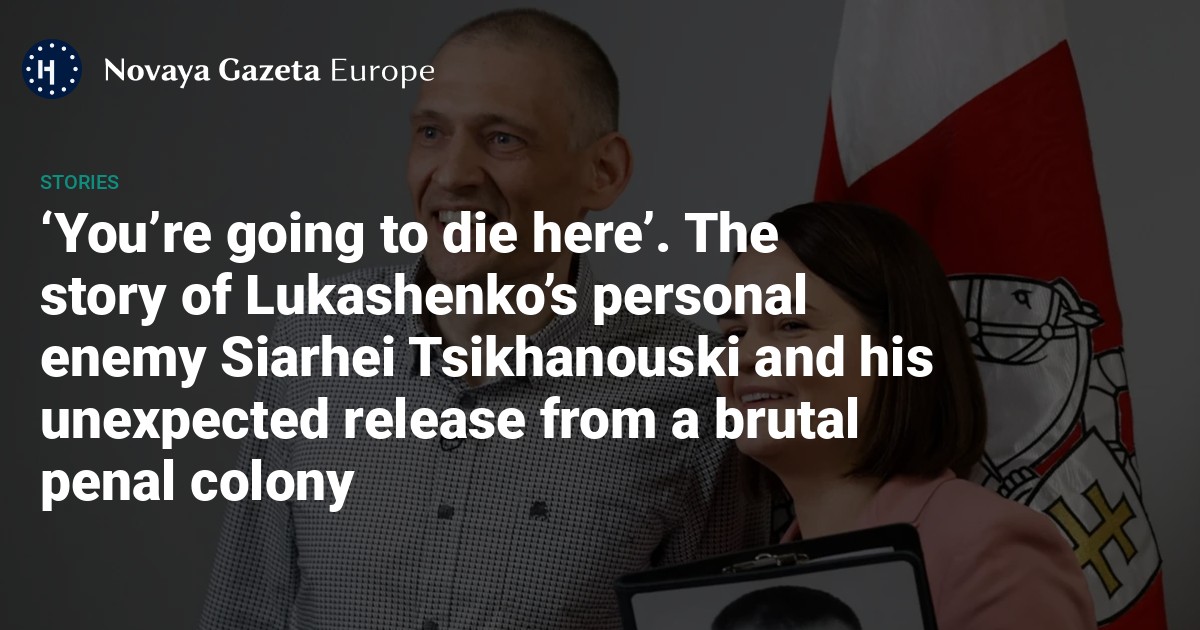
Siarhei Tsikhanouski, a personal enemy of Belarusian dictator Alexander Lukashenko for sparking a political reawakening in 2020, has been released from prison. This unlikely turn of events is in part due to behind-the-scenes dialogue between Minsk and Washington. Tsikhanouski’s quest to create a country worth living in irrevocably changed Belarus by forging, with his wife, an opposition to Lukashenko’s brutal regime.
Tsikhanouski is from Homyel, a city in southeastern Belarus. Before becoming a blogger and running for president, he organised concerts and ran nightclubs, mobile phone stores and a video studio. But by the time he turned 40, then married with two children, he had become disillusioned with Lukashenko’s quarter-century stranglehold on power, and wanted to see change in his country.
So, in 2019, Tsikhanouski created a YouTube channel called “A Country Worth Living In”, and drove around Belarus highlighting the rotten pipes and potholed roads, speaking with victims of fraud and raising awareness of the plight of ordinary people.
Tsikhanouski’s charm and good-nature allowed people from all walks of life to open up to him, and his YouTube channel was soon one of the most-watched independent broadcasts in the country. Lukashenko’s regime was not impressed. Tsikhanouski’s minibus was endlessly stopped by traffic police, and he was sporadically jailed for short periods, seemingly for no reason.
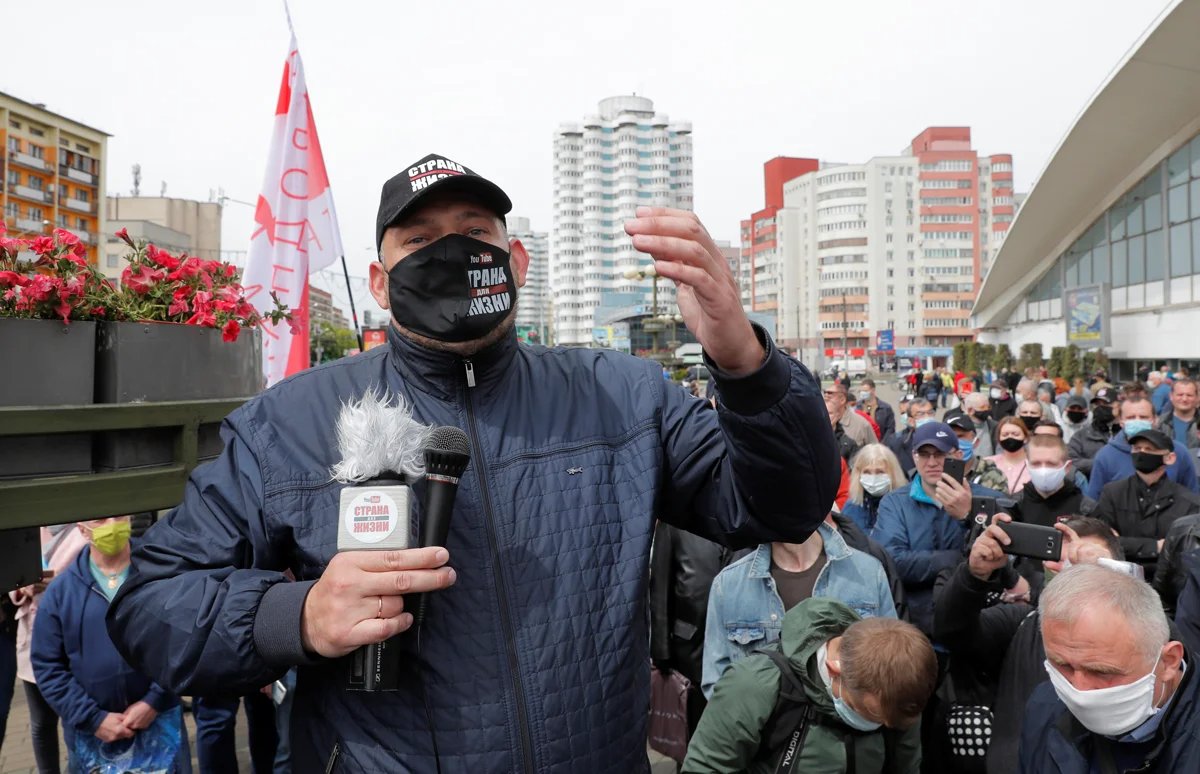
Tsikhanouski at a campaign rally in Minsk, Belarus, 24 May 2020. Photo: Vasily Fedosenko / Reuters / Scanpix / LETA
In the spring of 2020, shortly after a stint in detention, Tsikhanouski announced that he was running for president.
He started calling Lukashenko a cockroach and took to the streets carrying slippers. “Stop the cockroach!” became a popular slogan for political discontent in Belarus, as Tsikhanouski, who was running for president during the Covid pandemic, wore a cap and mask emblazoned with the words “A Country Worth Living In.”
Lukashenko was not a fan of Tsikhanouski’s campaign. On 6 May 2020, the day after Tsikhanouski applied to participate in the election, riot police detained him for holding “unauthorised meetings” with his subscribers. He was repeatedly detained for 15 days at a time, the standard length of detention for a misdemeanour.
Tsikhanouskaya applied to stand in the election herself, and Tsikhanouski supported his wife’s election campaign as soon as he was released.
This was meant to stop him from formally registering to run in the August election. But his wife, Sviatlana Tsikhanouskaya, submitted the paperwork for him. The Central Election Commission (CEC) said it didn’t have Tsikhanouski’s signature. So, an hour before the deadline, Tsikhanouskaya applied to stand in the election herself, and Tsikhanouski supported his wife’s election campaign as soon as he was released.
Days later, Lukashenko attacked the Tsikhanouski family on a visit to the Minsk Tractor Plant. He called Siarhei “slimy” and said of Sviatlana: “She knows no one in Belarus will vote for her… Our constitution isn’t supposed to be upheld by a woman. And our society isn’t ready to vote for one.”
On 29 May 2020, Tsikhanouski travelled to the western city of Hrodna to collect signatures for his wife’s campaign. He spoke to supporters, some of whom played guitar and carried a giant cockroach-crushing slipper. Suddenly the police appeared. Tsikhanouski’s supporters surrounded him, in what seemed like an attempt to prevent another arbitrary detention, but in the jostling, one officer fell. Within minutes, Tsikhanouski and his cameraman were detained by riot police.
The next day, the Interior Ministry reported that a criminal case had been opened against Tsikhanouski for violence against its officers. A couple of days later, security forces said they had found $900,000 in cash at the Tsikhanouski family dacha.
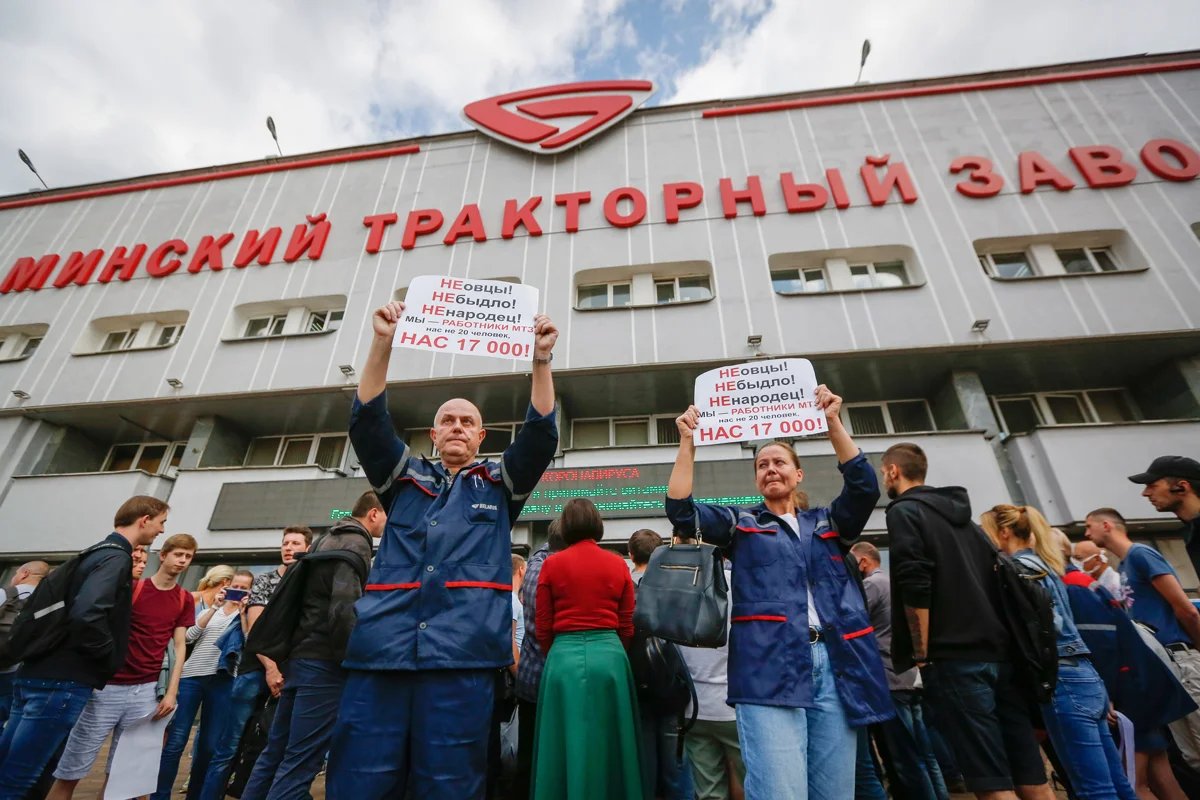
Minsk Tractor Plant employees protest the election results, Minsk, Belarus, 14 August 2020. Photo: Tatiana Zenkovich / EPA
Lukashenko later admitted that Tsikhanouski had been detained on his orders. Tsikhanouski stayed in prison for the next five years. But Tsikhanouski’s arrest only increased the country’s discontent.
After the 9 August election, the CEC declared Lukashenko the winner with 80.1% of the vote. Tsikhanouskaya received 10.1%. The opposition and independent observers reported massive falsifications, and Tsikhanouskaya refused to recognise the result. Unprecedented protests broke out across Belarus, with hundreds of thousands demanding free and fair elections.
A wave of political repression was unleashed against activists, independent media and opposition figures.
Tsikhanouskaya was forced to flee to Lithuania, but the protests went on. Thousands were detained and beaten, and a wave of political repression was unleashed against activists, independent media and opposition figures.
Tsikhanouski spent the summer of 2020 in a KGB prison. That autumn, with the protests still in full swing, Lukashenko met with several imprisoned opposition figures, including Tsikhanouski. Tsikhanouski was then charged with organising the protests, and the Investigative Committee said that his real objective was to unleash a “street war”. He was sentenced to 18 years in a penal colony.
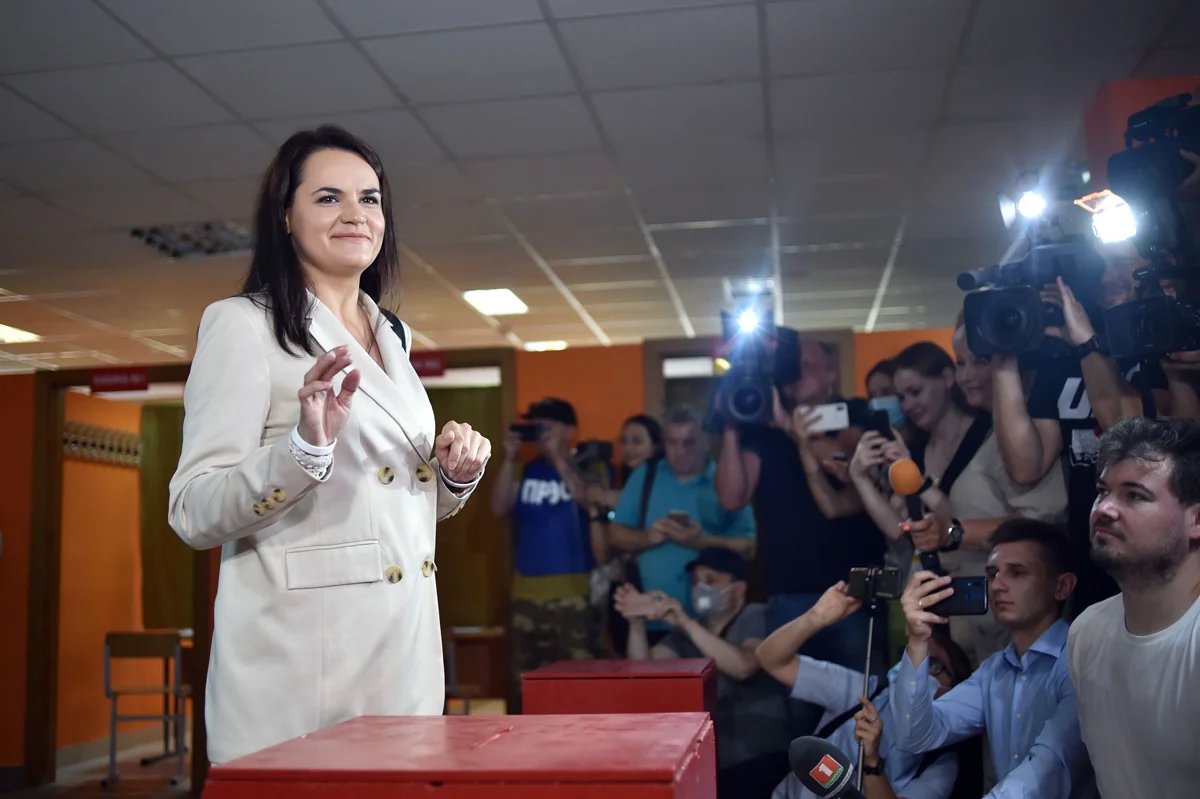
Sviatlana Tsikhanouskaya at a polling station in Minsk, Belarus, 9 August 2020. Photo: Sergey Gapon / AFP / Scanpix / LETA
Even imprisoned, Tsikhanouski remained a problem for the Lukashenko regime. Tsikhanouski was sentenced to an additional 1.5 years for “disobedience to the penal colony administration”, and transferred to a prison where he spent three years in solitary confinement.
“No letters, calls, lawyers — nothing,” he recalled. He wasn’t even allowed to see a priest.
Tsikhanouski was forced to endure extreme conditions that have likely caused severe long-term health problems. He lost about half of his body weight. “There was mandatory cleaning four times a day: twice for an hour and twice for half an hour. If you’re not scrubbing the whole time, they send you to solitary. … It’s a nightmare. It’s torture by any other name,” he recalls. The guards would say: “You won’t just serve the 20 years we’ve already given you. We’ll try you again. You’ll never get out of here. You’re going to die here.”
All contact with Tsikhanouski was cut off in March 2023.
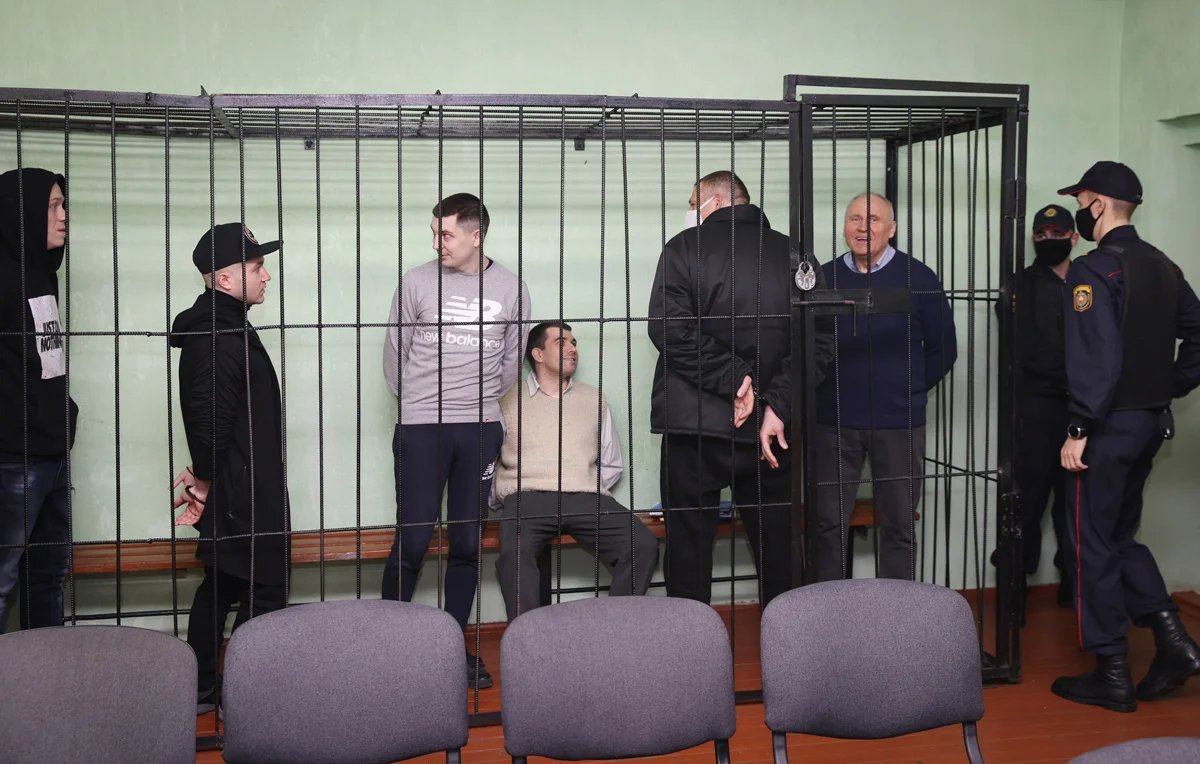
Tsikhanouski, with back to camera, in court in Homyel, Belarus, 14 December 2021. Photo: Sergey Kholodilin / BelTA / AP / Scanpix / LETA
The regime began periodically releasing small groups of political prisoners late last year. But high-profile opponents, including Tsikhanouski, remained where they were for any future trade-offs with the West.
Backstage negotiations between Minsk and the White House began in early 2025, after US President Donald Trump’s inauguration. In February, Christopher Smith, the US Deputy Assistant Secretary of State, went to Minsk for what was the first visit by a high-ranking American diplomat in five years. The American delegation met Lukashenko and Ivan Tertel, the head of the Belarusian KGB. The first deal led to the KGB handing over three prisoners to the Americans in a village on the border with Lithuania.
It was the first time the regime had released such a high-profile opposition figure.
Washington was reportedly considering easing sanctions against Belarus in exchange for the release of the remaining political prisoners. On 21 June, a trip to Belarus by US special envoy Keith Kellogg apparently sealed the deal. Kellogg met Lukashenko and 14 political prisoners, including Tsikhanouski, were released that same day. The prisoners were taken to the Lithuanian border and handed over to US and Lithuanian representatives with bags over their heads.
Shortly after that, Tsikhanouski reunited with his wife and children.
The news of Tsikhanouski’s release sent shockwaves through Belarusian society. State propaganda said the decision to release Tsikhanouski was made for humanitarian reasons, which Lukashenko had done at Trump’s request. It was the first time the regime had released such a high-profile opposition figure.
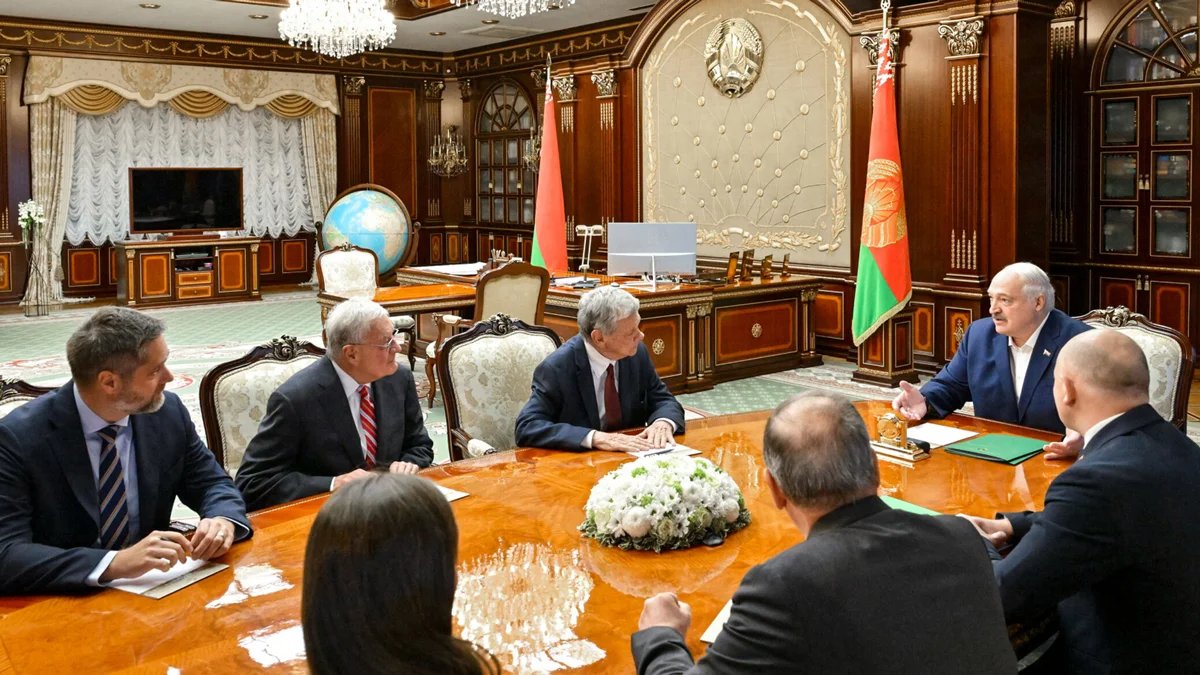
Alexander Lukashenko meets US Special Envoy Keith Kellogg, Minsk, Belarus, 21 June 2025. Photo: Lukashenko press service
Tsikhanouski appeared in front of dozens of TV cameras at Tsikhanouskaya’s press office in Vilnius on 22 June in a scenario that would have seemed impossible just 24 hours earlier. “I still can’t believe it,” he told reporters.
His appearance shocked many. The tall, strong, broad-shouldered, energetic, even cocky man was a shadow of his former self. His cheeks were sunken. His voice was soft, sometimes hoarse.
He covered his face with his hands and sobbed.
He tried to be light-hearted, joking that he had forgotten how to hold a microphone. The audience laughed with him. But when he spoke about seeing his daughter for the first time in five years, his humour vanished.
“My wife said: ‘Your daddy’s here.’ My daughter ran towards me and we were both in tears,” he said, his voice breaking. He covered his face with his hands and sobbed.
His wife continued speaking for him: “Our daughter didn’t recognise her dad. … He had to say: ‘I’m your dad,’ so that she knew it was really him.”
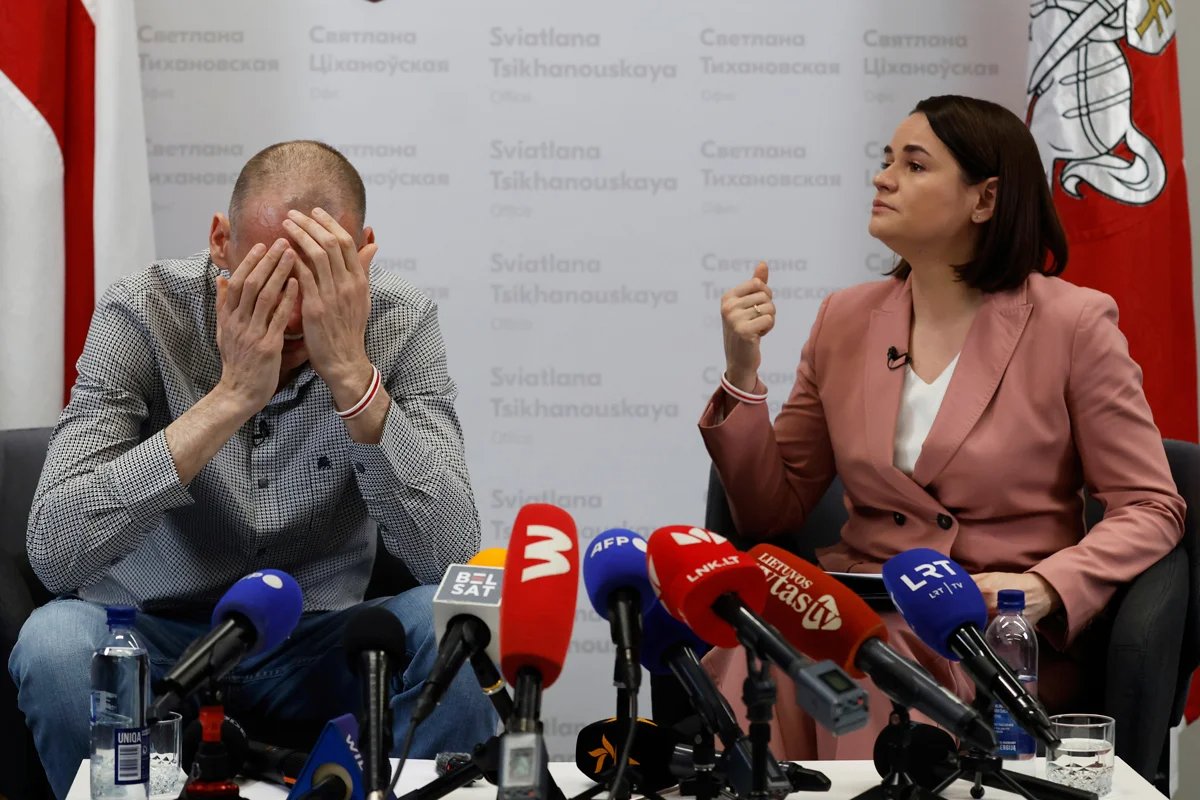
Sviatlana Tsikhanouskaya and husband Siarhei at a press conference in Vilnius, Lithuania, 22 June 2025. Photo: Mindaugas Kulbis / AP Photo / Scanpix / LETA
World leaders were soon tripping over each other to welcome him back to freedom. But releasing one of Lukashenko’s “personal enemies” doesn’t spell the end of his dictatorship. Many wonder why he released Tsikhanouski and not, say, Viktar Babaryka, who also ran for the presidency.
Is this Lukashenko trying to split the opposition in exile? The prison administration had already tried to turn Tsikhanouski against his wife, he told reporters.
Tsikhanouski declared: “Sviatlana Tsikhanouskaya, my wife, is the leader of the Belarusian opposition.” Tsikhanouski is likely to play a more independent role as a public figure, a journalist and a symbol of change.
But his name has now gone down in Belarusian history. The blogger that terrified a dictatorial regime is now a free man once again.
The Russian government has banned independent media. We were forced to leave our country in order to keep doing our job, telling our readers about what is going on Russia, Ukraine and Europe.
We will continue fighting against warfare and dictatorship. We believe that freedom of speech is the most efficient antidote against tyranny. Support us financially to help us fight for peace and freedom.
By clicking the Support button, you agree to the processing of your personal data.
To cancel a regular donation, please write to [email protected]
VPNovaya
Help Russians and Belarusians Access the Truth
